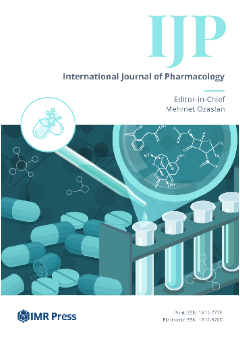International Journal of Pharmacology (IJP) is published by IMR Press from Volume 21 Issue 4 (2025). Previous articles were published by another publisher under the CC-BY licence, and they are hosted by IMR Press on imrpress.com as a courtesy and upon agreement.
Triphala Suppresses Ovarian Cancer Cell Proliferation through Induction of Apoptosis and ROS in vitro
Background and Objectives: Breast cancer is one of the leading cancers types globally. Several strategies have been followed to control breast cancer. Triphala is an Ayurvedic formulation that is composed of three different plant extracts. The current work aims at evaluating the effect of Triphala against ovarian cancer cell line PA-1 on the proliferations and the potential molecular mechanism of action. Materials and Methods: Breast cancer PA-1 cell lines were cultured in vitro and proliferation was measured using an MTT assay. Intracellular ROS level was measured using the Dichloro–Dihydro-Fluorescein Diacetate (DCFH-DA) assay and apoptosis were observable with AO/EB staining while; the expressions of associated genes were determined by polymerase chain reaction. Results: Cell viability was reduced by the dose-dependent manner of Triphala. Further, treatment with Triphala induced morphological changes indicative of apoptosis, displayed elevated levels of oxidative stress and typical signs of apoptosis were observable with AO/EB staining. Most importantly, Triphala abolished the cell adhesion in PA-1 cells. At the molecular level, Triphala caused a dose-dependent increase in the expression of cMyc, an oncogene responsible for the induction and maintenance of cancer. Another apoptotic regulator Bax was over-expressed by Triphala. Conclusion: This studies have shown the possibility of exploiting Triphala as an anti-cancer agent, especially against ovarian cancer.

